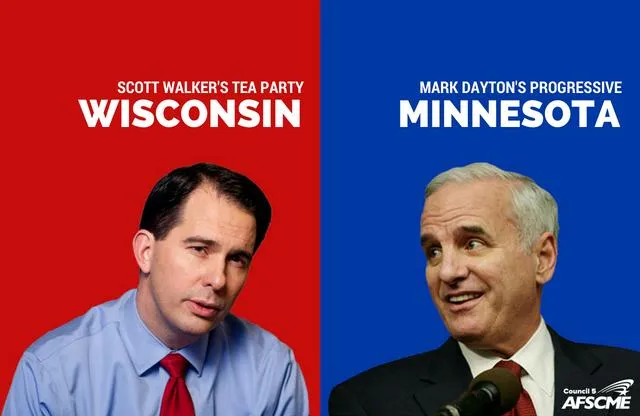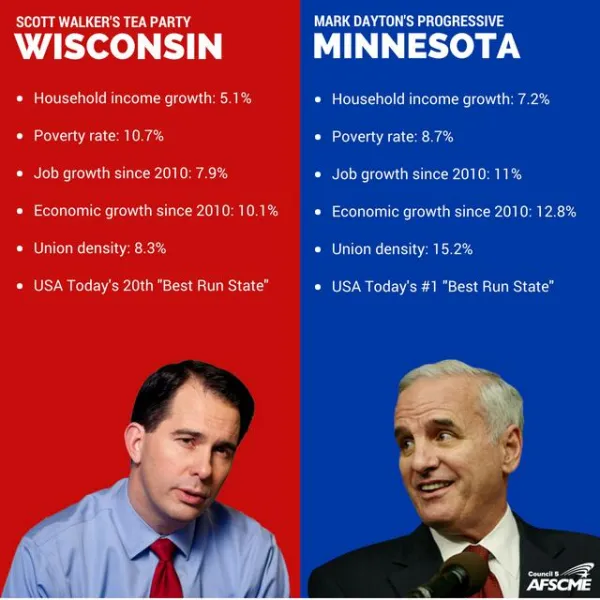Minnesota Outperforms Wisconsin

A new report shows Minnesota is a better state for working people than Wisconsin by nearly every important measure.
The Economic Policy Institute compared the two states’ records following the end of the Great Recession and the election of Gov. Mark Dayton and Gov. Scott Walker, from 2010 to 2017. The EPI says it looked to Minnesota and Wisconsin because of our two states’ proximity and widely diverging political policies.
Gov. Dayton focused on progressive policies such as raising the minimum wage, boosting public investment in infrastructure and education, strengthening safety net programs and labor standards, and taxing the wealthy.
In contrast, Walker cut taxes for businesses and the rich, privatized services, cut public funding of everything from schools to aid to the poor, and weakened unions.
The results, according to the EPI?
- Minnesota has had stronger job growth than Wisconsin since December 2010, at 11 percent compared to 7.9 percent.
- Wages grew faster here than in Wisconsin.
- The gender wage gap narrowed more here than in Wisconsin.
- Median household income grew more in Minnesota (7.2 percent compared to 5.1 percent). So did median family income, at 8.5 percent here vs. 6.4 percent in Wisconsin.
- Minnesotans are more likely to have health insurance.
- Minnesota reduced child poverty and overall poverty, while the poverty rate increased in Wisconsin under Gov. Walker. By 2016, Wisconsin’s poverty rate was 11.8 percent – where Minnesota’s was back in 2011, at the height of the Great Recession.
- Long-term unemployment is twice as high in Wisconsin.
- Union membership in Wisconsin fell to 8.3 percent.
- Wisconsin has more people moving away than moving in: The state lost nearly 18,000 more residents than it gained.
“In some cases, it is possible to draw a straight line between a particular choice or set of policy choices and the effect it had on the state’s economy and the welfare of its residents,” the report concludes.
The EPI report cites Wisconsin’s Act 10, Scott Walker’s budget bill that decimated unions’ collective bargaining rights, decreased membership and depressed wage growth. The EPI also points to Walker’s decisions to reject federal health exchange funding, Medicaid expansion, federal transportation money and expanded funding for federal unemployment insurance as factors in slowing economic growth and stalling employment.
In contrast, Minnesota invested in infrastructure, health care and education, which fueled our job growth, while expanding our safety net programs decreased the poverty rate.
“Importantly, there is little evidence that the tax increases enacted to finance the state’s investments, or the decision to raise the state minimum wage, did anything to hamper job growth,” the report concludes.
While Minnesota must address racial inequities such as high poverty rates and segregation in our urban centers, “The progress achieved in Minnesota over the past seven years is undeniable, and that progress has the fingerprints of good state policy all over it,” the EPI concludes.

